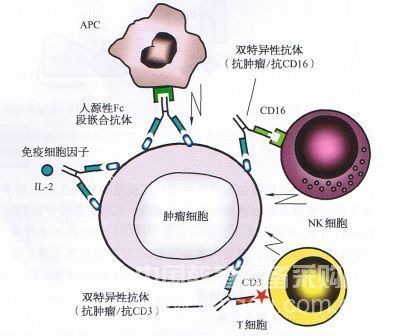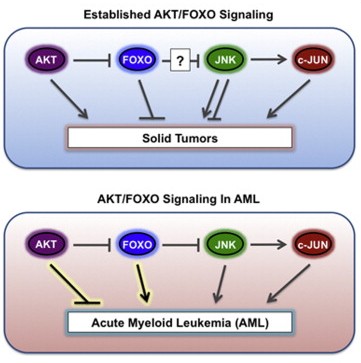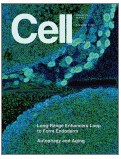Study finds key signaling mechanism of leukemia AKT / FOXO
Researchers from the Massachusetts General Hospital Institute of Regenerative Medicine, Harvard University and other departments have discovered a key signaling mechanism in leukemia, proposed new unknown functions of AKT / FOXOs, and proposed new treatments for patients with different genotypes Ideas. The research results were published in the journal "Cell". The corresponding author of the article is Dr. David T. Scadden, co-director of the Stem Cell Research Institute of Harvard University. This famous researcher is included in the top scientists in stem cell research. Research on the microenvironment regulation mechanism of differentiation and regeneration. AKT, also known as protein kinase B (PKB), is a serine / threonine kinase with a relative molecular mass of 60 000. This protein is associated with many malignant tumors and can participate in tumorigenesis by partially inhibiting FOXO tumor suppressors. In this article, the researchers discovered a novel reversible effect of AKT / FOXOs in acute myeloid leukemia AML, which provides new insights for further study of AML mechanisms and cancer signaling pathways. Acute myeloid leukemia AML is an aggressive cancer that originates from the rapid growth of abnormal blood cells in the bone marrow, and its incidence increases with age. The most common symptoms of AML are weight loss, fatigue, fever, night sweats, and anorexia. This disease can spread to other parts of the body such as lymph nodes, liver, and spleen. In this article, the researchers analyzed multiple AML patients and found that regardless of their genotype, FOXOs are activated in 40% of AML patients, which is contrary to previous research findings. Through further experiments, the researchers found that AML is indeed different from other cancers. It requires low expression level AKT and high expression level FOXO. Moreover, this activity of FOXO is also related to the JNK / c-JUN signaling pathway. These experimental data all indicate the important role of AKT / FOXO and the JNK / c-JUN signaling pathway in maintaining barriers to differentiation. This barrier can be used to Targeting inhibition of leukemia will provide new ideas for the treatment of leukemia patients with different genotypes, and also help scientists to analyze the signaling pathways in leukemia in depth. In addition, Dr. Scadden's research group recently published a new method for separating stem cells from other hematopoietic cells and tumor cells in the journal Nature Biotechnology. They put peripheral blood mononuclear cells (PBMCs) into a pulsed electric field. Monocytes can be selectively removed, and some small lymphocytes can be retained. These small lymphocytes still have functions and can be centrifuged. Separate them from dead cells. The researchers first mixed PBMCs with tumor cells, and then put the mixture into an electric field, and found that tumor cells can also be selectively removed. Moreover, implanting a transplantable tumor cell into an electric field and then implanting it into immunodeficient mice showed no tumorigenesis. Finally, the researchers put the peripheral blood stem cells into an electric field for research, and found that this method can increase CD34-positive / CD38-negative stem cells while maintaining their function. Compared with the cell separation technology that uses antibody for purification, this method requires fewer reagents, so its cost is lower. For patients with hematological malignancies requiring transplantation, this method is the best way to isolate and purify and obtain stem cells. (Bioon.com) doi: 10.1016 / j.cell.2011.07.032 PMC: PMID: AKT / FOXO Signaling Enforces Reversible Differentiation Blockade in Myeloid Leukemias Stephen M. Sykes, Steven W. Lane, Lars Bullinger, Demetrios Kalaitzidis, Rushdia Yusuf, Borja Saez, Francesca Ferraro, Francois Mercier, Harshabad Singh, Kristina M. Brumme, Sanket S. Acharya, Claudia Scholl, Zuzana Tothova, Eyal C. Attar, Stefan Fröhling, Ronald A. DePinho, D. Gary Gilliland, Scott A. Armstrong, David T. Scadden AKT activation is associated with many malignancies, where AKT acts, in part, by inhibiting FOXO tumor suppressors. We show a converse role for AKT / FOXOs in acute myeloid leukemia (AML). Rather than decreased FOXO activity, we observed that FOXOs are active in 40% of AML patient samples regardless of genetic subtype. We also observe this activity in human MLL-AF9 leukemia allele-induced AML in mice, where either activation of Akt or compound deletion of FoxO1 / 3/4 reduced leukemic cell growth, with the latter markedly diminishing leukemia-initiating cell (LIC) function in vivo and improving animal survival. FOXO inhibition resulted in myeloid maturation and subsequent AML cell death. FOXO activation inversely correlated with JNK / c-JUN signaling, and leukemic cells resistant to FOXO inhibition responded to JNK inhibition. These data reveal a molecular role for AKT / FOXO and JNK / c-JUN in maintaining a differentiation blockade that can be targeted to inhibit leukemias with a range of geneti c lesions. Hollow Bamboo Handle,Bamboo Wood Block,Stainless Steel Casting,8Pcs Knife Block Set YANGJIANG SHENGJIA TRADING CO., LTD. , https://www.yjkitchenknife.com

